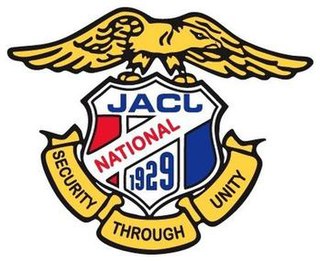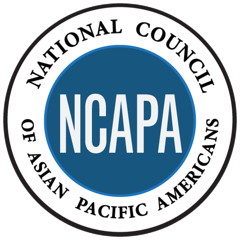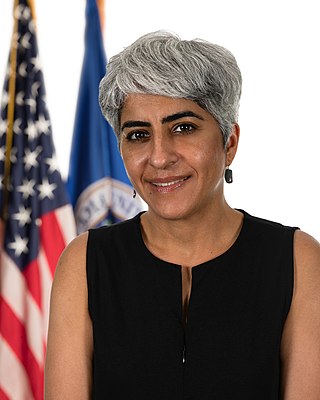
The Asian American Journalists Association (AAJA) is a 501(c)3 nonprofit educational and professional organization based in San Francisco, California with more than 1,500 members and 21 chapters across the United States and Asia. The current president is Washington Post reporter Nicole Dungca. The executive director is Naomi Tacuyan Underwood.

The Japanese American Citizens League is an Asian American civil rights charity, headquartered in San Francisco, with regional chapters across the United States.

OCA-Asian Pacific American Advocates is a non-profit organization founded in 1973, whose stated mission is to advance the social, political, and economic well-being of Asian Americans and Pacific Islanders (AAPIs) in the United States.

The National Council of Asian Pacific Americans (NCAPA) is a coalition of 35 national Asian-Pacific American organizations in the United States. Founded in 1996 and based in Washington D.C., NCAPA seeks to expand the influence of Asian-Pacific Americans in the legislative and legal arenas, and enhance the public's and mass media's awareness and sensitivity to Asian-Pacific American concerns.
Running Start is a nonprofit organization that trains high school, college and young professional women to develop the confidence, capabilities and connections they need to run for elected office and win. Each year, Running Start hosts about 100 trainings around the country. It has trained over 20,000 women.

The Hinckley Institute of Politics is a nonpartisan institute located on the University of Utah campus in Salt Lake City, Utah. Its purpose is "to engage students in transformative experiences and provide political thought leadership" through involving students in practical politics and in governmental, civic and political processes.
The Asian Pacific American Medical Student Association (APAMSA), founded in 1995, is the nation's largest organization representing Asian Pacific Islander American (APIA) medical students. APAMSA is a student-governed and national organization that promotes awareness and advocacy of issues affecting the APIA community. They have over 4,500 active medical students, pre-medical students, interns, medical residents, and practicing physicians.
The National Asian Pacific Center on Aging (NAPCA) is an American advocacy and service organization for elderly Asian Americans and Pacific Islanders (AAPI).
The Asian American and Pacific Islander Policy Research Consortium (AAPIPRC) focuses on critical policy issues facing the Asian American and Pacific Islander communities. Conceived of as part of the White House Executive Order 13515 (2009) the consortium supports, promotes, and conducts applied social science and policy research. In addition, Professor Paul M. Ong proposed two courses of action for AAPIPRC, one which formalizes working relationships among university-based AAPI research institutions and the other which would include publishing the proceedings of the briefs to inform policy.

The White House Initiative on Asian Americans, Native Hawaiians, and Pacific Islanders (WHIAANHPI) is a United States governmental office that coordinates an ambitious whole-of-government approach to advance equity, justice, and opportunity for Asian Americans, Native Hawaiians, and Pacific Islanders. The Initiative collaborates with the Deputy Assistant to the President and AA and NHPI Senior Liaison, White House Office of Public Engagement and designated federal departments and agencies to advance equity, justice, and opportunity for AA and NHPIs in the areas of economic development, education, health and human services, housing, environment, arts, agriculture, labor and employment, transportation, justice, veterans affairs, and community development.

Outreachy (previously the Free and Open Source Software Outreach Program for Women) is a program that organizes three-month paid internships with free and open-source software projects for people who are typically underrepresented in those projects. The program is organized by the Software Freedom Conservancy and was formerly organized by The GNOME Project and the GNOME Foundation.
This is a timeline of notable events in the history of non-heterosexual conforming people of Asian and Pacific Islander ancestry, who may identify as LGBTIQGNC, men who have sex with men, or related culturally-specific identities. This timeline includes events both in Asia and the Pacific Islands and in the global Asian and Pacific Islander diaspora, as the histories are very deeply linked. Please note: this is a very incomplete timeline, notably lacking LGBTQ-specific items from the 1800s to 1970s, and should n0t be used as a research resource until additional material is added.
The Coalition of Asian Pacifics in Entertainment (CAPE) is a 501(c)(3) non-profit organization that advocates for Asian Americans and Pacific Islanders in the entertainment industry. Established in 1991, CAPE "champions diversity by educating, connecting, and empowering Asian American and Pacific Islander artists and leaders in entertainment and media." The organization focuses on training development program and incubators for emerging and mid-level entertainment industry professionals and media consulting and training services.
The National Queer Asian Pacific Islander Alliance (NQAPIA) is an American federation of Asian American, South Asian, Southeast Asian. and Pacific Islander LGBTQ organizations. NQAPIA was formed in 2007, as an outgrowth of the LGBT APA Roundtable working groups at the 2005 National Gay Lesbian Task Force Creating Change Conference in Oakland, California. NQAPIA seeks to build the capacity of local LGBT AAPI organizations, invigorate grassroots organizing, develop leadership, and challenge homophobia, racism, and anti-immigrant bias. The organization "focuses on grass-roots organizing and leadership development."
GAPIMNY is an all-volunteer-run organization that provides a range of social, educational, and cultural programming for queer and transgender people who are Asian and/or Pacific Islander in the New York City metropolitan area to support each other. The organization's community building efforts is intricately tied to political education and mutual aid.

Kiran Arjandas Ahuja is an American attorney and activist serving as the director of the United States Office of Personnel Management (OPM). She served as the chief of staff to the OPM director from 2015 to 2017. She assumed that position after serving for six years as the director of the White House Initiative on Asian Americans and Pacific Islanders. An Indian-born American, she has also been a lawyer with the United States Department of Justice and a founding director of a non-profit, the National Asian Pacific American Women's Forum. In 2017, she became the CEO of Philanthropy Northwest.

National Asian Pacific American Women's Forum is a community-based non-profit organization based in Chicago and founded in 1996. They have offices in Atlanta and Washington, DC, as well as 15 chapters across the country. It is an organization that focuses on empowering AAPI women and girls to participate in critical decisions that affect their lives, families, and communities. NAPAWF uses a reproductive justice framework to motivate and push AAPI women to be involved in driving systemic change and policy in the United States.
For the Hong Kong actress and singer, see Miriam Yeung.
Glenn Duque Magpantay is the former executive director of the National Queer Asian Pacific Islander Alliance, an instructor at Brooklyn Law School and Hunter College/CUNY, and a former civil rights attorney in the role of Democracy Program director for the Asian American Legal Defense and Education Fund. In 2023, Glenn D Magpantay was appointed as a Commissioner to the United States Commission on Civil Rights by Senate Majority Leader Charles Schumer. He is chair of the LGBT Committee of the Asian American Bar Association of New York, former co-chair of the Gay Asian & Pacific Islander Men of New York, and recognized as an "authority on the federal Voting Rights Act and expert on Asian American political participation, including bilingual ballots, election reform, minority voter discrimination, multilingual exit polling, and census." He has served as a commissioner on the New York City Voter Assistance Commission. He is also a contributing writer for the Huffington Post. The Glenn Magpantay Leadership Award at his undergraduate alma mater, the State University of New York at Stony Brook, is named after him.

The National APIDA Panhellenic Association (NAPA) is an umbrella council for twenty Asian, Pacific Islander, and Desi American fraternities and sororities in universities in the United States.










